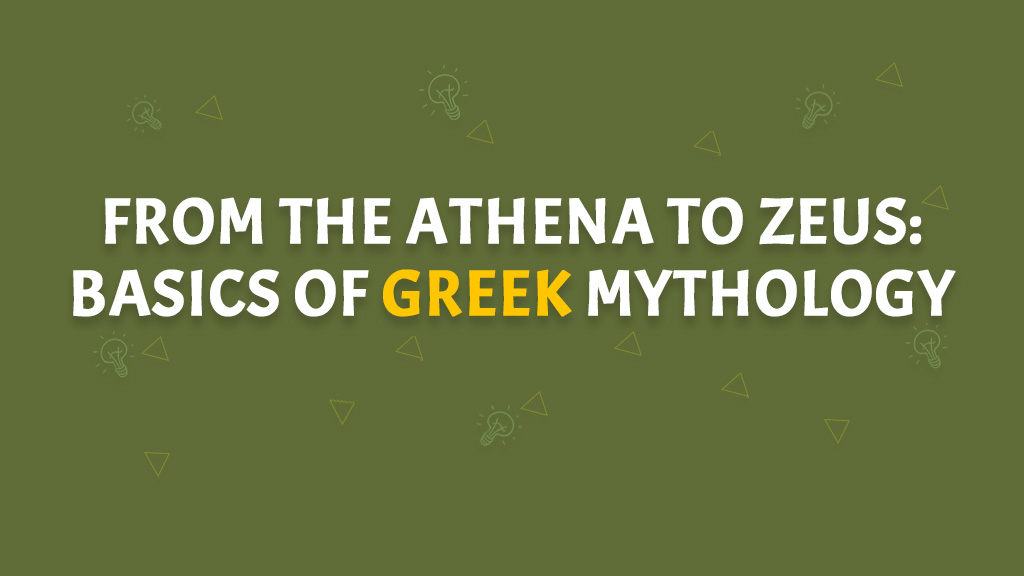❤️It's Trivia, but Sweeter❤️
From The Athena To Zeus: Basics Of Greek Mythology

Greek mythology is an ancient collection of stories, legends, and beliefs that have shaped the cultural and literary landscapes of Western civilization for thousands of years. These myths recount the adventures of gods, goddesses, heroes, and mythical creatures, all of whom play vital roles in the creation, structure, and fate of the world. Greek mythology is rich with symbolism, offering profound insights into human nature, morality, and the eternal battle between good and evil. The stories of the gods and heroes not only served to entertain but also to explain the natural world, the origins of human institutions, and the complexities of life.
One of the most prominent figures in Greek mythology is Zeus, the king of the gods. As the ruler of Mount Olympus, Zeus presided over the heavens, earth, and the mortal realm. He was known for his immense power and authority, but also for his numerous romantic escapades that resulted in many offspring. Zeus’ dominion over the skies meant that he controlled thunder and lightning, and his thunderbolt became one of the most iconic symbols of divine wrath. Despite his immense power, Zeus was often depicted as a figure of balance, meting out justice and maintaining order in both the divine and mortal worlds.
Athena, the goddess of wisdom and warfare, holds a particularly important place in Greek mythology. Born fully grown and armored from the head of Zeus after he swallowed her mother, Metis, Athena was a symbol of reason, strategy, and courage. She was the patron goddess of Athens, a city named in her honor, and was revered by both warriors and philosophers alike. Athena was often depicted with her helmet and spear, symbolizing her warrior aspects, while her wisdom and calm demeanor set her apart from the more aggressive gods of war. Athena’s role as a protector of the city and her strategic approach to warfare emphasized the importance of intellect in overcoming challenges, making her one of the most respected deities in the Greek pantheon.
Poseidon, the god of the sea, earthquakes, and horses, was another major deity in Greek mythology. Poseidon’s temperamental nature and his connection to the unpredictable forces of the sea made him both a respected and feared figure. As the ruler of the oceans, Poseidon was often depicted with a trident, a three-pronged spear that symbolized his dominion over the waters. Sailors, fishermen, and those who relied on the sea for sustenance or travel often prayed to Poseidon for safe passage, as his mood could shift from calm to violent storms at any given moment. Poseidon’s power extended beyond the sea as well; his ability to cause earthquakes linked him to the primal forces of the earth, further cementing his importance in Greek mythology.
The heroes of Greek mythology are often depicted as individuals who face seemingly insurmountable odds, embarking on epic quests to prove their courage and strength. One of the most famous of these heroes is Heracles, also known as Hercules. Known for his immense strength and bravery, Heracles was the son of Zeus and the mortal Alcmene. His life was filled with legendary deeds, the most famous of which are the twelve labors he performed to atone for a terrible mistake he had made. These labors included tasks like slaying the Hydra, capturing the Golden Hind, and cleaning the Augean stables. Heracles’ enduring strength and determination, as well as his vulnerability to the gods’ capriciousness, made him one of the most iconic and revered heroes in Greek mythology.
In contrast to Heracles’ strength, another figure known for his cleverness and cunning is Odysseus. His journey home after the Trojan War, as recounted in the Odyssey, is one of the most enduring stories in Greek mythology. Odysseus was a master of strategy and diplomacy, often using his wits to escape danger and overcome obstacles. His ten-year journey to return to Ithaca after the war is filled with trials, including encounters with the Cyclops, the Sirens, and the goddess Circe. Odysseus’ intelligence, resourcefulness, and resilience make him a hero celebrated for his wisdom as much as for his bravery.
The gods of Greek mythology are also known for their complex personalities and their frequent involvement in the lives of mortals. For instance, Hera, the wife of Zeus, is often portrayed as a goddess of marriage and family, but her jealousy and vindictive nature towards Zeus’ lovers and their offspring led to numerous myths about her anger and retribution. Her intense emotions often led her to torment mortal women, especially those who had relationships with Zeus, yet she was also seen as a protector of women in marriage, making her a deity of contradictions.
Ares, the god of war, represents another side of Greek mythological life. Unlike Athena, who embodies strategic warfare and wisdom, Ares is associated with the chaotic and brutal aspects of battle. Known for his aggressive nature and violent tendencies, Ares was often seen as a god of bloodshed and destruction. His presence in battles often led to carnage and chaos, making him less respected by the other gods and mortals alike. Nonetheless, Ares played an important role in the broader narrative of war and conflict, representing the raw, primal aspects of combat.
Another notable deity in Greek mythology is Apollo, the god of the sun, music, poetry, and prophecy. Apollo’s talents extended across many domains, from healing and medicine to the arts. As the sun god, Apollo was associated with light, knowledge, and enlightenment, and he was often depicted with a lyre, symbolizing his mastery of music. Apollo was also considered the god of prophecy, and his oracle at Delphi was one of the most important in the ancient world, with people from all corners of the Greek world seeking his divine insights. Apollo’s multi-faceted role as a god of both intellect and the arts made him one of the most revered deities in the pantheon.
Medusa, the Gorgon, is one of the most famous and tragic figures in Greek mythology. With snakes for hair and a gaze that turned anyone who looked at her into stone, Medusa is often depicted as a villain, but her backstory reveals a more complex character. Once a beautiful maiden, Medusa was transformed into a monster by Athena as punishment for being violated by Poseidon in her temple. This transformation led Medusa to become a feared figure, and the hero Perseus ultimately defeated her by using a reflective shield to avoid her deadly gaze. Medusa’s story has been interpreted in various ways, reflecting themes of transformation, victimhood, and the consequences of divine wrath.
The role of the gods and heroes in Greek mythology was not only to entertain, but to communicate deeper truths about the nature of life, the struggles faced by human beings, and the intricate balance between fate, free will, and divine intervention. These myths offer lessons on the importance of honor, justice, wisdom, and courage, while also highlighting the darker aspects of human nature, such as jealousy, wrath, and pride. Whether through the trials of Heracles, the journey of Odysseus, or the wisdom of Athena, Greek mythology provides a window into the human condition, helping to explain the world and our place within it.



